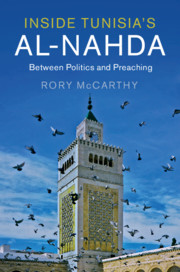
-
Select format
-
- Publisher:
- Cambridge University Press
- Publication date:
- September 2018
- October 2018
- ISBN:
- 9781108560511
- 9781108472517
- 9781108459938
- Dimensions:
- (228 x 152 mm)
- Weight & Pages:
- 0.48kg, 248 Pages
- Dimensions:
- (228 x 152 mm)
- Weight & Pages:
- 0.38kg, 246 Pages
You may already have access via personal or institutional login
Book description
In the wake of the Arab uprisings, al-Nahda voted to transform itself into a political party that would for the first time withdraw from a preaching project built around religious, social, and cultural activism. This turn to the political was not a Tunisian exception but reflects an urgent debate within Islamist movements as they struggle to adjust to a rapidly changing political environment. This book re-orientates how we think about Islamist movements. Drawing on extensive fieldwork with grassroots activists of Tunisia's al-Nahda, Rory McCarthy focuses on the lived experience of activism to offer a challenging new perspective on one of the Middle East's most successful Islamist projects. Original evidence explains how al-Nahda survived two decades of brutal repression in prison and in social exclusion, and reveals what price the movement paid for a new strategy of pragmatism and reform during the Tunisian transition away from authoritarianism.
Contents
Metrics
Altmetric attention score
Full text views
Full text views help Loading metrics...
Loading metrics...
* Views captured on Cambridge Core between #date#. This data will be updated every 24 hours.
Usage data cannot currently be displayed.
Accessibility standard: Unknown
Why this information is here
This section outlines the accessibility features of this content - including support for screen readers, full keyboard navigation and high-contrast display options. This may not be relevant for you.
Accessibility Information
Accessibility compliance for the PDF of this book is currently unknown and may be updated in the future.


